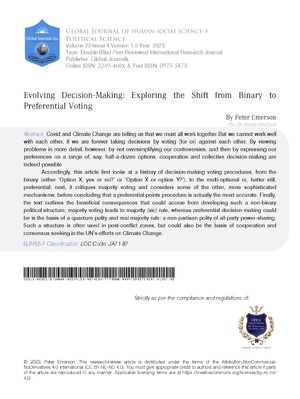Evolving Decision-Making: Exploring the Shift from Binary to Preferential Voting
Abstract
Covid and Climate Change are telling us that we must all work together But we cannot work well with each other if we are forever taking decisions by voting for or against each other By viewing problems in more detail however by not oversimplifying our controversies and then by expressing our preferences on a range of say half-a-dozen options cooperation and collective decision-making are indeed possible Accordingly this article first looks at a history of decision-making voting procedures from the binary either Option X yes or no or Option X or option Y to the multioptional or better still preferential next it critiques majority voting and considers some of the other more sophisticated mechanisms before concluding that a preferential points procedure is actually the most accurate Finally the text outlines the beneficial consequences that could accrue from developing such a non-binary political structure majority voting leads to majority sic rule whereas preferential decision-making could be is the basis of a quantum polity and real majority rule a non-partisan polity of all-party powersharing Such a structure is often used in post-conflict zones but could also be the basis of cooperation and consensus seeking in the UN s efforts on Climate Change
Downloads
- Article PDF
- TEI XML Kaleidoscope (download in zip)* (Beta by AI)
- Lens* NISO JATS XML (Beta by AI)
- HTML Kaleidoscope* (Beta by AI)
- DBK XML Kaleidoscope (download in zip)* (Beta by AI)
- LaTeX pdf Kaleidoscope* (Beta by AI)
- EPUB Kaleidoscope* (Beta by AI)
- MD Kaleidoscope* (Beta by AI)
- FO Kaleidoscope* (Beta by AI)
- BIB Kaleidoscope* (Beta by AI)
- LaTeX Kaleidoscope* (Beta by AI)
How to Cite
References

Published
2023-10-04
Issue
Section
License
Copyright (c) 2023 Authors and Global Journals Private Limited

This work is licensed under a Creative Commons Attribution 4.0 International License.